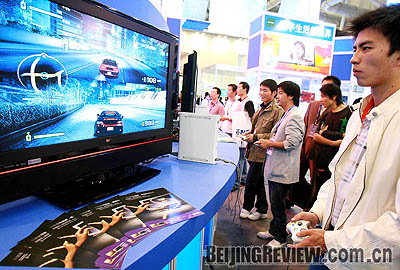|

FUN GAME: A young man tries the newly developed online car racing game at Suzhou's annual Electronics Manufacturing Exposition at the industrial park
WANG JIANZHONG
Chinese manufacturers have long been the original equipment manufacturers for their foreign counterparts due to a lack of innovation and world-known brands. But signs point to a change in this department, where manufacturers in Suzhou are realizing that branding is no longer just a fancy business term, but a very real survival necessity.
"The idea to develop our own brands was naturally born, when profits from foreign trade continuously shrank," said Wu Xiaodong, Vice President of POSITEC Machinery (China) Co. Ltd., a producer of power tools headquartered in the Suzhou Industrial Park (SIP) in east China's Jiangsu Province.
SIP is a cooperative project between Chinese and Singaporean governments. Launched in February 1994, SIP has raced to impressive growth figures. In 2006, the Park's GDP was a credible 68 billion yuan ($9.71 billion) with imports and exports totaling $50 billion and $25.1 billion respectively, according to the Suzhou government's official website.
SIP encourages innovation and brand awareness. "New technology is integral," said Wu, whose company began life as a trading company for electric power tools, but shifted to developing self-owned brands in 2000. "Modern technical advances are increasing at a speed well beyond the wildest imaginations of consumers. To have self-owned brands, you must have patents," he said.
As a giant manufacturer, "Made in China" dominates world markets. But China has very few well-known brands of its own. Statistics from the Ministry of Commerce show that less than 20 percent of exporters have their own brands. Homegrown brands account for no more than 10 percent of total exports.
POSITEC is not alone in moving toward brand success at SIP. "China established its first intellectual property rights protection center at state level in SIP in 2003. It provides various favorable incentives for innovative hi-tech start-ups launched by returned overseas Chinese," said Liu Jie, Director of Media Center of SIP's Publicity Office. Liu said brand awareness is rising at SIP, although profits for processing trade have fallen sharply in recent years.
Mounting arguments against Chinese manufacturers over the protection of intellectual property rights also prompted some Chinese companies to launch a brand initiative for the establishment of their own innovative domestic brands.
One of these is Great Star Software Co. According to an official at the hi-tech incubator located at SIP, who declined to give his name, the CAD software independently developed by the company and certified by China's patent office, performs equally well with that of software world leader, Autodesk, and has sold well worldwide. Another Park innovator, digital entertainment software company Voyage Century, the creator of Snail Game, has gone into the overseas market in the form of independent intellectual property and is very popular among foreign online gamers.
Innovation is the key to creating more brands and that is why authorities have placed innovation at the top of state strategy, said Li Lianzhong, head of the Economic Bureau affiliated with the Policy Research Center of the Central Committee of the Communist Party of China, at a brand development summit last June. "From price wars to brand rivalries, from demands for quality to the consumption of reputed brands, it seems that the possession of well-known brands is playing an increasingly big role in how to measure the competitive power and economic strength of a nation."
China lags far behind its foreign counterparts in terms of innovative research and development lacking some of the originality of companies in industrialized economies such as the United States or the EU. "Despite the rising brand awareness, China also needs to improve its legal and market environment to prepare for brand challenges," added Li. | 